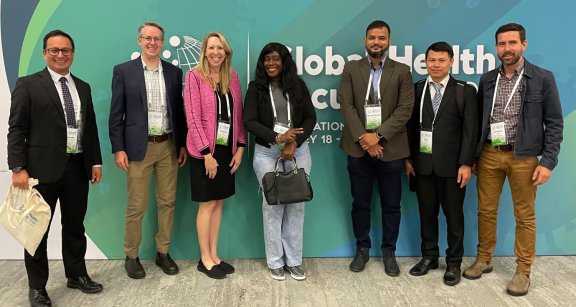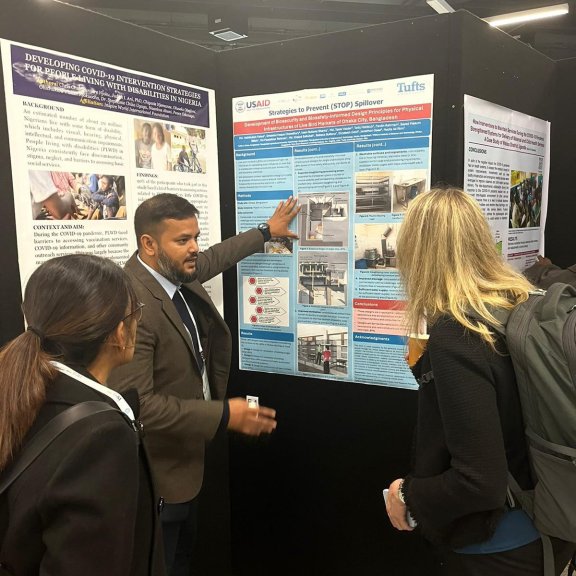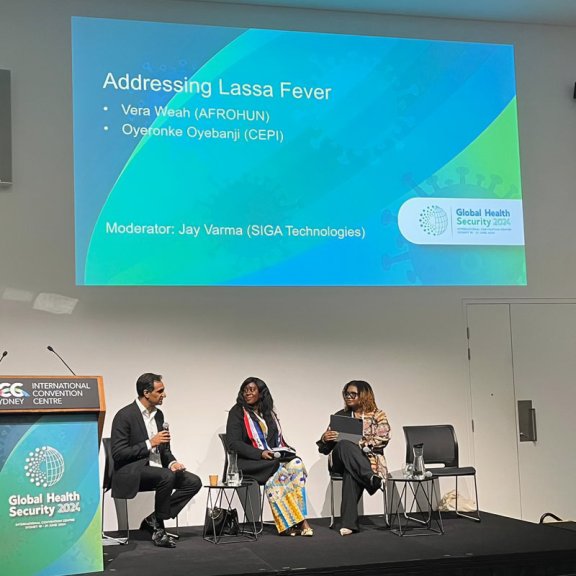
The third Global Health Security Conference featured presentations and posters from STOP Spillover’s Bangladesh, Cambodia, Côte d’Ivoire, Liberia, and Sierra Leone Country Teams. The conference took place from June 18-21, 2024 in Sydney, Australia. The Bangladesh and Sierra Leone Country Teams had two presentations or posters, while Cambodia, Côte d’Ivoire, and Liberia each had one presentation/poster. Attending the conference from STOP Spillover were Jon Gass (Deputy Director), Md. Habibullah Fahad (representing Bangladesh), Vera Weah (representing Liberia), and Theara Teng (representing Cambodia).

Bangladesh’s two poster presentations included “An Exploration of Factors Contributing to Failure and Success of Previous Interventions to Improve Biosecurity and Biosafety in Live Bird Markets (LBM) of Bangladesh” and “Development of Biosecurity and Biosafety-informed Design Principles for Physical Infrastructures of LBM of Dhaka City, Bangladesh.” The first poster presented the team’s research on factors associated with the outcomes of earlier interventions to improve the biosafety of LBM in Dhaka. The second focused on the infrastructural details of STOP Spillover’s biosafety intervention in LBM in Dhaka.
Theara Teng gave an oral presentation on “Evaluation of Zoonotic Viral Spillover Risk on Bat Guano Farms in Cambodia.” Bat guano farm conditions were tested using a participatory surveillance system to identify risk factors associated with potential viral disease spillover. Through these findings, the STOP Spillover Country Team identified farmers’ perceptions of low risk working with guano, despite previously detected viruses from guano and the farming environment, as well as poultry-associated viruses at farms. In addition, viruses were detected on food and food preparation surfaces in guano-farming and neighboring households. In response, One Health partners are developing and implementing syndromic-targeted surveillance to detect and respond to spillover events in guano farming communities faster and more efficiently.
The Côte d’Ivoire (CDI) STOP Spillover Country Team’s poster presentation was titled “Developing Guidelines and Training for Safe Handling and Processing of Wild Meat Using Biosafety Practices in Côte d’Ivoire.” Hunting wild meat is banned in CDI, but the wild meat trade is widespread. Due to the unregulated nature of butchering and processing wild meat, infectious disease is a major risk to those handling wildlife. In response, the Country Team developed biosafety guidelines and training for those involved in the wild meat trade. The guidelines and training addressed hygiene in processing, waste management, sanitization, cleaning, and disinfection; the proper use of PPE; handling blood exposure accidents; and identifying and reporting endangered wildlife species. These efforts not only provide insights into pathogen exposures, but also empower participants to make informed choices about biosafety practices to reduce disease transmission risk.

Vera Weah’s oral presentation was titled “Preventing Lassa Fever in Liberia: A Replicable Co-Design Process.” Given that human-rodent contact promotes the spread of Lassa virus, the STOP Spillover Country Team aims to minimize direct exposure to rodent reservoir hosts in several Liberian communities. Food and water storage protection has been proven to eliminate contact; through the use of more functional tables, food/dish pantries, and caged food containers, it is possible to reduce the risk of Lassa virus spillover in Liberia.
The Sierra Leone Country Team showcased two poster presentations: “Understanding the Environmental and Sociodemographic Risk Factors for Lassa Fever in Eastern Sierra Leone” and “Understanding and Mitigating Zoonotic Spillover Risks in Sierra Leone’s Wild Meat Value Chain.“ Similar to Liberia, Sierra Leone’s first poster focused on mitigating the spread of Lassa virus through the increased protection of food storage and improved hygiene habits. These solutions were created based on the findings of focus groups, key informant interviews, and direct observation of 344 participants. The Sierra Leone team is also working to prevent spillover in the wild meat trade. Through studies of the meat value chain, the team was able to establish hunting and processing wild meat as the two highest risk contact points. The team concluded that important drivers of wild meat hunting and trade are cultural and are strongly influenced by socioeconomic factors.
STOP Spillover’s presentations and participation at the Global Health Security Conference 2024 helped to disseminate knowledge and learning about viral spillover risks to the global health security community.